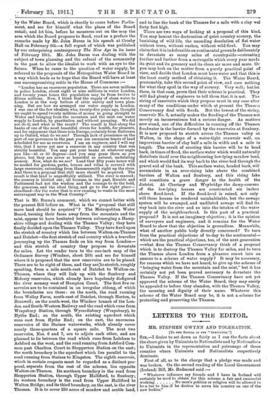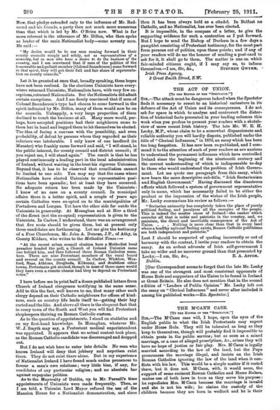LETTERS TO THE EDITOR.
MR. STEPHEN GWYNN AND TOLERATION.
[To Sr. EDITOR or THE " SPECTATOR."] desire to set down as fairly as I can the facts about the share given by Unionists to Nationalists and by Nationalists
to Unionists in the representation and patronage of those counties where Unionists and Nationalists respectively dominate.
First of all, as to the charge that a pledge was made and was broken. On the second reading of the Local Government (Ireland) Bill, Mr. Redmond said
"Whatever influence my friends and I have in Ireland will certainly be used to obtain for this scheme a fair and successful
working No man's politics or religion will be allowed to be a bar to him if he desires to serve his country on one of the new boclies." Now, that pledge extended only to the influence of Mr. Red- mond and his friends, a party then not much more numerous than that which is led by Mr. O'Brien now. What is far more relevant is the utterance of Mr. Dillon, who then spoke as leader of the main Nationalist body—some seventy men. He said : —
" My desire would be to see men coming forward in their county councils simply and solely, not as representatives of a minority, but as men who have a desire to do the business of the country, and I am convinced that if men of the politics of the honourable and gallant member [Colonel Saunderaen) come forward in that spirit, they will get their full and fair share of representa- tion on county councils."
Let it be granted at once that, broadly speaking, these hopes have not been realised. In the elections Unionists have every- where returned Unionists; Nationalists have, with very few ex- ceptions,returned Nationalists. But theNationalists did admit certain exceptions. And I am firmly convinced that if men of Colonel Saunderson's type had chosen to come forward in the spirit indicated by Mr. Dillon, many of them would now be on the councils. Unhappily, a very large proportion of them declined to touch the business at all. Many more would, per- haps, have accepted positions had their neighbours come to them hat in hand and begged them to let themselves be elected. The idea of facing a canvass with the possibility, and even probability, of defeat by persons whom they regarded as their inferiors was intolerable. I only know of one landlord (in Munster) who frankly came forward and said, " I will stand, in the public interest, for county council and district council ; if you reject me, I will stand again." The result is that he has played continuously a leading part in the local administration of Ireland, without waiving in the least his rigorous Unionism.
Beyond that, it has to be observed that conciliation cannot be limited to one side. You may say that the cases where Nationalists have elected Unionists to representative posi- tions have been sporadic ; but at least they have occurred. No adequate return has been made by the Unionists : I know of no case on a county council. In municipal affairs there is a better spirit, and a couple of years ago certain Catholics were co-opted on to the municipalities of Portadown and Lurgan. Yet here the other side far outdo the Unionists in generosity. At Monaghan and at Birr a third of the direct (not the co-opted) representation is given to the Unionists. In Carlow, I understand, there was an arrangement that five seats should be given them, but at present only three candidates are forthcoming. Let me give the testimony of a Free Churchman, Mr. John A. Duncan, J.P., of Athy, in County Kildare, who writes to the Methodist Times
"At the recent urban council election here a Methodist local preacher headed the poll, a Church of Ireland Unionist came one behind him, and then followed three Roman Catholics mem- bers. There are nine Protestant members of the rural board and several on the county council. In Carlow, Wicklow, Wex- ford, Naas, Athlone, Drogheda, Kilkenny, and doubtless other towns, Protestants got elected, though in none of these cases would they have even a remote chance had they to depend on Protestant votes." '
I have before me in print half a dozen published letters from Church of Ireland clergymen testifying in the same sense. Add to this the fact, well known to me, that many other such clergy depend on their Catholic neighbours for offices of kind- ness, such as country life lends itself to—getting their hay carted and the like. And above all there is the eloquent fact that in every town of the South and West you will find Protestant
shopkeepers thriving on Roman Catholic custom.
As to the question of appointments, I stand on statistics and on my first-hand knowledge. In Monaghan, whatever Mr.
W. J. Smyth may say, a Protestant medical superintendent was appointed. It appears that no actual contest took place, as the Roman Catholic candidate was discouraged and dropped out.
But I do not wish here to enter into details. No man who knows Ireland will deny that jobbery and nepotism exist there. They do not exist there alone. But in my experience of Nationalist Ireland I have found much undue proneness to favour a man's own relations ; very little bias, if any, for candidates of any partieular religion; and no absolute bar against unpopular politics.
As to the Mayoralty of Dublin, up to Mr. Parnell's time appointments of Unionists were made frequently. Then, as I am told, a Unionist Lord Mayor refused the. use of the Mansion House for a Nationalist demonstration, and since then it has been always held as a citadel. In Belfast no Catholic, and no Nationalist, has ever been elected.
It is impossible, in the compass of a letter, to give the supporting evidence for such a contention as I put forward. But I hope to send the Bishop of Durham in a few days a pamphlet consisting of Protestant testimony, for the most part from persons out of politics, upon these points ; and if any of your readers will do me the honour of sending a post-card to ask for it, it shall go to them. The matter is one on which fair-minded citizens ought, if I may say so, to inform
2 Great Smith Street, S.W.







































 Previous page
Previous page